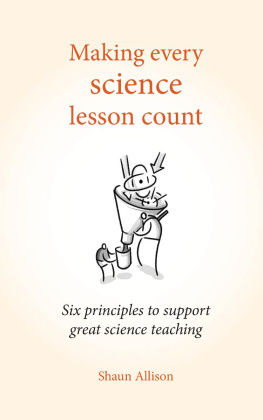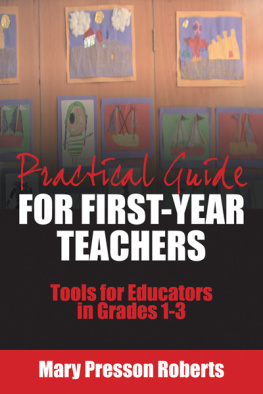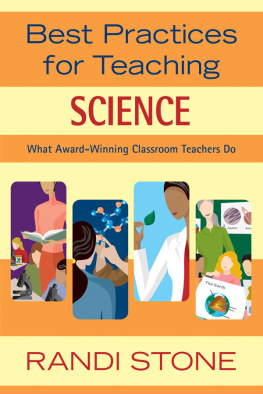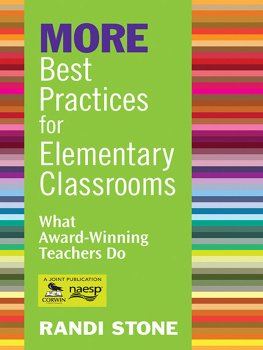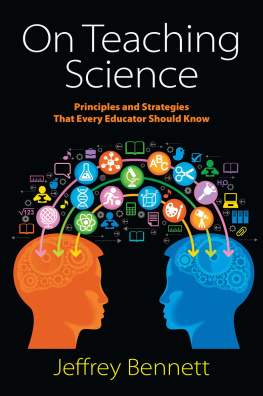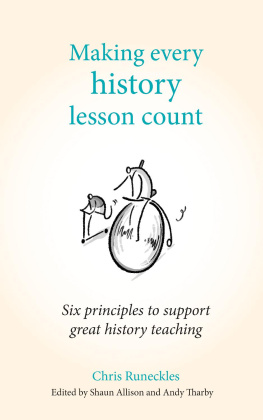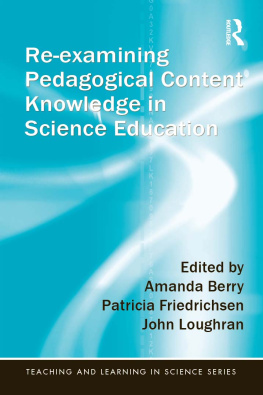Praise for Making Every
Science Lesson Count
Making Every Science Lesson Count is a high-quality book written by an experienced and highly effective science teacher. Drawing on evidence-informed practice, Shaun Allison discusses the principles underpinning great teaching and learning. The principles of challenge, explanation, modelling, deliberate practice, feedback and questioning are carefully and richly illustrated with examples drawn from teaching all three sciences. In doing so, Shaun Allison is making an important contribution to the pedagogy of science education.
This is a book for all science teachers, no matter whether they are very experienced heads of science or science teachers starting out in their careers. It prompts all of us to think about the way we create opportunities for our students to learn about science.
I will use this book to shape CPD with science teachers and it will be on the essential reading list for my PGCE science trainees.
Dr Brian Marsh, Principal Lecturer, University of Brighton
Every science teacher should get hold of a copy of this fantastic book.
Shaun has a brilliant way of synthesising complex research on pedagogy and cognitive science, with each chapter presenting clear ideas with a theoretical underpinning which is bang up to date. His writing is accessible and is brought to life with inspirational anecdotes and stories.
This book would be excellent as a key source of expertise in high-quality CPD I only wish Id had a copy when I started out teaching physics.
David Weston, CEO, Teacher Development Trust
Shaun Allison shares the insights of an experienced classroom practitioner who takes tried-and-tested teaching and learning strategies, known to and used by experienced teachers of science, and adds pedagogical significance to them.
The underpinning concept of providing ways to become a great science teacher permeates every page, while the reflective questions at the end of each chapter are a useful way for the reader to encapsulate the key points therein. The foreword and acknowledgements highlight the need to value practitioners whilst promoting the need for, and value of, creativity in science teaching and learning. The passion for science held by the author is evident such passion is a way to guide learners towards becoming effective and independent students.
Making Every Science Lesson Count will be useful for trainee teachers preparing for PGCE assignments as it requires deep reading to appreciate the plethora of valuable guidance and advice shared. Any teacher undertaking a science subject knowledge development programme will most definitely benefit from the books pedagogical guidance to supplement their course, while experienced teachers working on postgraduate theses will also find this work of value and will appreciate the teacher-led ideas.
Dr Lyn Haynes, Senior Lecturer, Canterbury Christ Church University, Programme Director, INSPIRE STEM PGCE
I would like to extend my warmest congratulations to Shaun Allison and Andy Tharby on the success of their first book Making Every Lesson Count. This detailed work must have taken many hours of thought, research and planning.
When Shaun contacted me, outlining his intention to write another work, my first thought was how does he manage to find the time! I feel honoured indeed to write the foreword for this new publication and expect it to be another hit.
I have spent a lifetime trying to teach science (more specifically, chemistry) successfully. Obviously the pupils must enjoy the lessons and they must understand all aspects of them, so we need to make every lesson count.
When I first started my teaching career in Porthcawl Secondary Modern School in 1967, I was quite shocked! The science teaching involved very little practical work; it was mainly chalk and talk. There were no laboratory assistants or technicians so everything, including washing up, was done by the teacher (usually after school). How did I manage? I resolved to write new schemes of work to incorporate practical skills, request more apparatus and money and spend more time in the laboratory after school.
When I was given the post in Porthcawl, I knew that the school would be made a comprehensive in 1971, and that I would then be allowed some input into the design and stocking of the laboratories. There would be technicians and assistants in all laboratories. Wonderful, I couldnt wait!
One of the biggest problems for teachers across the school was discipline and gaining the respect of the pupils. In 1971, the school also appointed Roger Burnell to set up a drama department. We became great friends, but it was his teaching of the subject that really impressed me. Pupils of all ability were captivated, enthralled and excited by this very talented man. He allowed them freedom to express their opinions, and to suggest ways of improving work themselves but, most importantly, he taught them to have respect for other people and their opinions. Roger taught them how to set up pictures in their minds of how the topic or the character could be portrayed. I was determined to use these ideas in my science teaching.
My main idea was to present science as a series of stories which were all linked together. Of course, the pupils may not understand some of the scientific words, so these would need to be explained using mini stories as well. The language used by teachers must vary depending upon the ability of the classes and the volume of the oral delivery must vary constantly as well, in order to capture and maintain the interest of the pupils.
I firmly believe that drama must play a big part in captivating pupils in their science learning. The budding teacher must imagine the laboratory as a stage and the pupils as the audience. After all, we are trying to get pupils interested in our subject. The more interesting and alive the teacher is, the greater chance they have of building good relationships with pupils. Once this is established, pupils will be enthused and want to learn more about the wonders of science.
Once we have the pupils engaged, we must try to present the material in a logical sequence. I used to plan my lessons for the following week on a Friday night and write detailed sequences of lessons for all classes. I was very fortunate to have excellent support from my technicians and would write a list of apparatus, chemicals and so on needed for the experiments and projects. This same format was used throughout my teaching career.
For me, the most important part of successful teaching is gaining the respect of pupils. Once that is established, and with the help of a good logical teaching scheme, pupils will become engaged and will enjoy the lessons (well, most of them!). Discipline, of course, is essential and should be insisted upon, especially in the laboratory environment.
The good science teacher is the one who loves and knows their subject well and wants to do their best to pass that passion and knowledge on to their young charges. Make it interesting, make it exciting! There is a whole new world out there!
E. E. Clarke, Former Head of Chemistry,
Porthcawl Comprehensive School
This book is dedicated to all the amazing science teachers and lab technicians across the world, especially the fantastic science teams that I have been fortunate enough to work with over more than two decades of science teaching. A very special mention must go to the current science team at Durrington High School, of which I am immensely proud to be a part. Our young people couldnt ask for a more committed and hard-working group of scientists to help nurture and grow their scientific curiosity and understanding.

